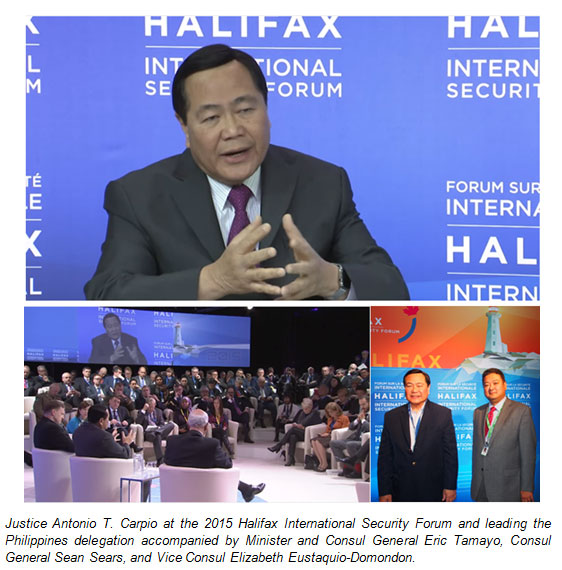
Amid the backdrop of the terrorist attacks in Paris, the suicide bombings in Lebanon, the lockdown in Brussels, and the mall attacks in Mali, as well as having three international flights diverted to its airport practically one after the other by bomb threats, the City of Halifax in Nova Scotia hosted the 7th and 2015 Edition of the Halifax International Security Forum (HISF) from 20 to 22 November 2015. The Honourable Canadian Defence Minister Harjit Sajjan welcomed all delegates and led all officials and military leaders of Canada in attendance.
Philippine Senior Associate Justice Antonio Carpio was among the distinguished roster of speakers at the forum which Maclean`s magazine billed as the definitive event where "people who wield power on matters of war and international security" converge, as the Magazine noted how "dozens of defence ministers, military leaders, think-tank leaders, academics and journalists will have it out on today's toughest global issues."
Joining Justice Carpio were Minister and Consul General Eric Gerardo Tamayo of the Philippine Embassy in Ottawa, Consul General, a.h. Sean Sears, and Vice Consul, a.h. Elizabeth Eustaquio-Domondon of the Philippine Consulate General in Halifax.
Justice Carpio shared top billing in the panel discussion held on 21 November at noon devoted to Broken China: Handle With Care, moderated by Ms. Lyse Doucet, Chief International Correspondent of the British Broadcasting Corporation. Joining Justice Carpio were Dr. Masashi Nishihara, President, Research Institute for Peace and Security; Admiral Michael Rogers, Commander, United States Cyber Command, Director National Security Agency / Chief, Central Security Service; and Dr. Russell Trood, Professor International Relations and Director of the Griffith Asia Institute, Griffith University
The panel discussion was framed by compelling introductory remarks by Admiral Harry T. Harris, Commander of the US Pacific Fleet who noted that "as China's economy has grown, so have its ambitions." Nevertheless, Admiral Harris underscored that US-China relations are more constructive than destructive. The Admiral referred to the building spree of China in the South China Sea as "Sandcastles in the Sea" and as the "Great Wall of Sand" in referring to the "extreme scope" of China's claims. He indicated that adhering to international law is important and China cannot do whatever it pleases.
The Defense News magazine notes that the Philippines has filed a legal objection to China's activities in the South China Sea, and echoed the statement of Justice Carpio that the Philippines is no match for China, so it brought the dispute to a forum where armaments do not count. Justice Carpio emphasized that "we cannot live with a dispute where China claims everything."
Justice Carpio explained that it is hoped that the maritime dispute will be resolved in accordance with UNCLOS, but we still have that territorial dispute over the Spratlys. - and the way we propose to solve that is through the proposal of marine biologists - to say that the Spratlys are the hatchery of the South China Sea - the fish that we catch in the South China Sea are spawned in the Spratlys.
Justice Carpio remarked that while China may not be broken, it is breaking the law by building artificial islands in international waters. He expressed concern that China will resort to declaring an Air Defense Identification Zone (ADIZ) once they have completed their building spree in the South China Sea. When asked what he would say to Chinese President Xi Jingping, Justice Carpio would recall what Deng Xiaoping aid at the United Nations in 1974 that "if one day China should change her color and turn into a superpower, if she too should play the tyrant in the world, and everywhere subject others to her bullying, aggression and exploitation, the people of the world should identify her as social-imperialism, expose it, oppose it and work together with the Chinese people to overthrow it." END
